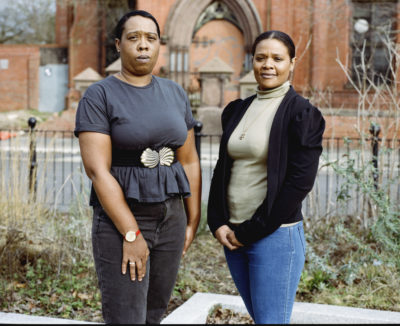St Paul of the Cross, the founder of the Passionists, was known for his desire to teach people to pray, and share what he had experienced. How do we pray? What role does prayer take in our lives? We asked three people pursuing a Passionist spirituality how their sense of prayer has changed over time.
Joanne Crompton
Joanne Crompton is a member of the Community of the Passion, and works with people who have a dementia-type illness.
prayer for me is something which is ingrained in everything. My first daily connection with God happens when I get up at 6am to let the dog into the garden. I pause to look at the trees and the sky, whether it’s clear or raining. Standing and being myself before God, my thoughts turn to what lies ahead that day doing and who I’m likely to be meeting.
I enjoy the rhythm of the seasons; the feeling that I am part of the cycle of nature. It reminds me of Newman’s phrase ‘the whirling year’ and how time seems to speed up when you’re getting older. I particularly enjoy being on the beaches of North Wales in Springtime, with the nearby mountains providing a backdrop to it all.
I connect with God throughout the day, including on my drive to work. There is a statue of Our Lady in a churchyard that I pass by that serves to remind me. Throughout the day I sense God’s presence in people I meet. It feels easy to connect with God in nature, but not so easy in people, and it took many years before my ‘eyes were opened’ to perceive what had always been the case.
My prayer life has changed significantly over time. I think it is important to discover a sense of spiritual independence from what you were taught when young and to find your own path in prayer. Like most Catholics, I grew up saying traditional prayers like the rosary, but as a teenager I found that I wanted to explore the mystery of it all. I was taken by Buddhism and the practice of mindfulness, and I learned about the inner voice and how it can be negative. I discovered that you are not your mind but instead you are an observer. I appreciated the importance of not being caught up in chaotic thought patterns and the need to observe oneself from a distance. My prayer has matured to the point where it is a very ordinary and natural part of my everyday life.
In a sense, I have come full circle. I am still growing in prayer (which is, after all, another term for one’s relationship with God) because this journey will not end until my last breath. I find comfort in set prayers like the Divine Office, in saying the psalms, and in reading the Prophet Isaiah. What I thought I had left behind, I have actually returned to, but now with fresh eyes to understand it, through the lens of greater life experience. I love using the Community of the Passion prayer book on a regular basis. Sometimes there are moments when particular prayers come to me. One example would be ‘Strength and protection may your passion be’ from the hymn Soul of my Saviour. At other times, there are no words and the spirit expresses your prayer for you.
•
The first book about prayer that inspired me was one called Hail Mary, Full of Grace. This simple children’s book taught me about the great love of God that dwelt in Mary’s heart. From my teenage years I recall An Idiot’s Guide to Meditation, which brought me a lot of pleasure. St Alphonsus Liguori’s beautifully bound book on prayer taught me that God is not a magical being but is present with us in ordinary, everyday moments.
I have been especially inspired by the lives of Passionists, Blessed Dominic Barberi and Venerable Elizabeth Prout. I smile at how Elizabeth kept getting told off by Fr Gaudentius for laughing too loudly. I Love the human aspect of this story. Dominic was so gentle and had a really big heart which moved him to cover up for others’ mistakes. The best book I’ve Read about Dominic is written by Fr. Alfred Wilson CP. It gives a spiritual portrait of this saint, who has long been a faithful friend to me.
Another influence on my spiritual life has been the late John Sherrington CP. He was a genuinely beautiful soul. I also benefitted a lot from knowing David Williams CP, who possessed a great mind and knew what it was like to live and pray in the spiritual ‘desert’.
“It’s important to discover a sense of spiritual independence from what you were taught.”
At the centre where I work, I recently met a lady who is in the early stages of dementia and, following a stroke, has lost the ability to walk. She is also isolated from her family. Despite this, she is astonishingly serene and calm. She may be the most beautiful soul that I have ever had the privilege to meet. I think that she is a living saint who knows God and is happy to go to meet him whenever he will call her.
I would advise someone who is new to prayer not to expect too much too soon. Often people pray in the context of dreadful things happening in their lives or in the world around us. It is fine to pray for what we want, but there is no guarantee of a happy ending. All of us face challenges. So, by all means pray for what you desire, but do not become disheartened if prayers do not appear to be answered, even if you are praying for a sick loved one. Ask yourself if your expectations are realistic, and keep things real and in perspective: which doesn’t mean trying to avoid suffering at all costs in life. God’s will is not always aligned with our own. It is natural to want to know where God is in the midst of suffering, but the answers to our questioning are often unexpected. Always bear in mind that we follow a crucified Christ who promises that we will be ok in the end, despite our present sufferings. It is not easy being a follower of this Christ but experience of his love for us helps us to bear what comes. After all, finding God in the pain and not just in the pretty sky lines is what being a Passionist is about.
Read part one (Michael O’Halloran) and part two (Bishop William Kenney).
Related Stories

Experiences of Passionist prayer, pt. 2: Bishop William Kenney
How do we pray? What role does prayer take in our lives? We asked three people pursuing a Passionist spirituality how their sense of prayer has changed over time.
Jun 24 2023

Experiences of Passionist prayer, pt. 1: Michael O’Halloran
How do we pray? What role does prayer take in our lives? We asked three people pursuing a Passionist spirituality how their sense of prayer has changed over time.
Jun 18 2023

Change Everything: Why Reformed are transforming lives for prison leavers
Kemi and Natasha Ryan are the epitome of the DIY start-up. Their organisation, Reformed, is a ground-up, first-hand mentoring service working with prison leavers, helping them to find a path back to work and a fuller life.
Apr 10 2023

